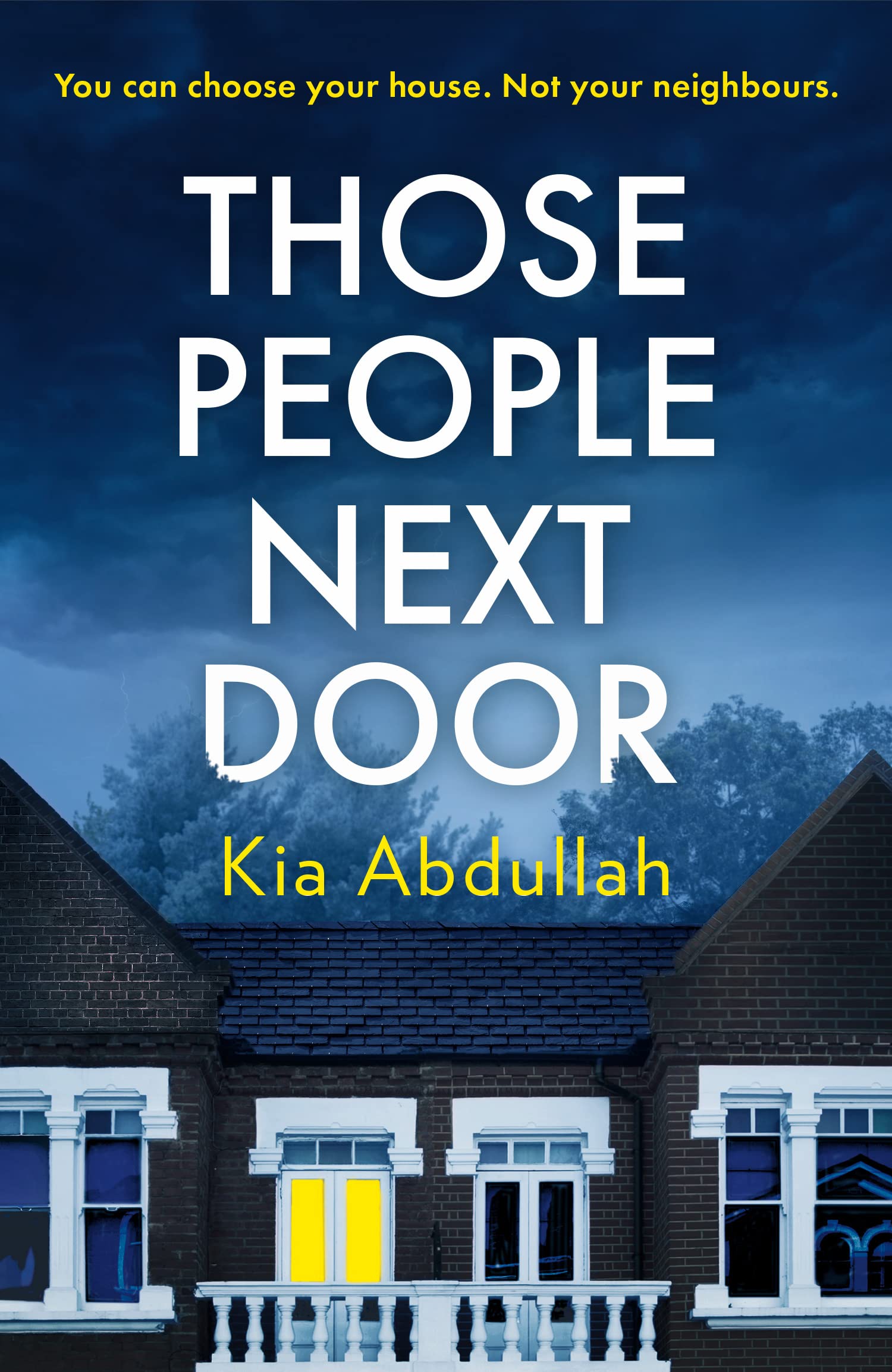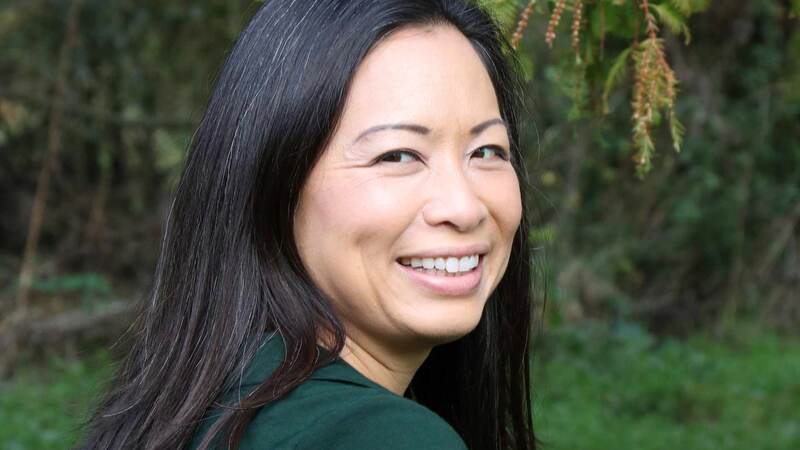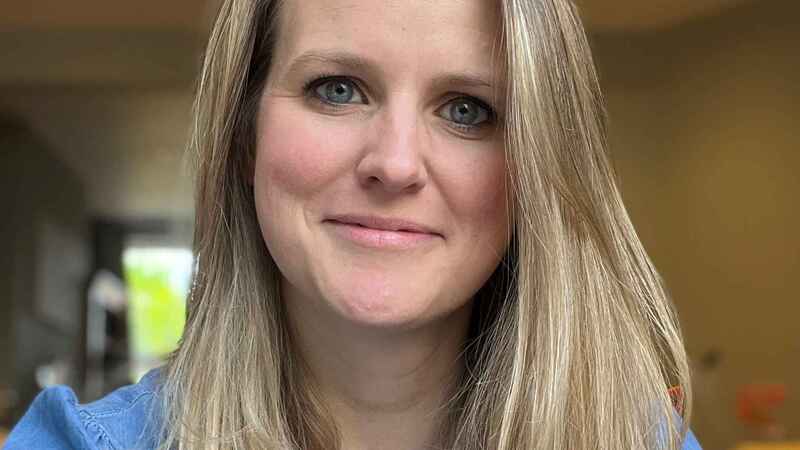You are viewing your 1 free article this month. Login to read more articles.
Kia Abdullah in conversation about investing in working-class writers and the possibilities of genre fiction
East London-raised Kia Abdullah on the possibilities of genre fiction, nightmare neighbours and who gets to be a write.
The inciting incident in Kia Abdullah’s fourth and upcoming book, Those People Next Door, was in part inspired by something that happened when she was growing up in east London. One of eight children in a council house in Tower Hamlets, the local authority with the highest level of child poverty in the UK, according to the latest census, Abdullah stuck up a St George’s Cross in their window during the World Cup.
“I was about 10 or 11,” she recalls. “And when my dad came home, you could just see the pink in his face. He ripped it down and said, ‘Don’t you dare do that again.’ As a child, I didn’t know what the problem was; that for him, the St George’s Cross spoke of violence, of racism, of him trying to make a living in east London.”
Years later, when through the pandemic she was living in Yorkshire, a neighbour knocked on Abdullah’s door to offer her a Union Jack to “stick into our plant pot” to celebrate VE day. “I found that quite interesting,” she explains from her home in Newham. “I thought: ‘What would happen if I refused? I’m sure nothing would have happened because they were really lovely neighbours. But that put the seed of the idea in my head that, well, what if you didn’t buy into that symbolism because it meant something different to you than it did to them?”
It’s these ostensibly innocuous but ultimately charged acts, and the different meanings attached by different parties to them, that fuel Abdullah’s latest propulsive thriller about nightmare neighbours. It tells the story of the Khatun family and their move to the Blenheim estate, hoping to make a better life for themselves.
It’s a really interesting relationship and just ripe for conflict and high drama
Their fresh start is tainted, however, when their next-door neighbour, Tom, knocks over a Black Lives Matter banner propped up in their front garden, catalysing a chain of events that snowballs into catastrophe (and an explosive twist) that leaves everyone questioning themselves, their assumptions and prejudices, and the people they thought they were.
“Salma’s instinct is to quietly take [the sign] inside and to maintain that good relationship with him,” Abdullah explains. “But when do you stand up for yourself? When do you stand up for the people you love? And of course, when you are living cheek by jowl with somebody, you don’t want to ignite hostilities. But sometimes, you’ve got to negotiate that and stand up for yourself and the people you love. That’s quite a terrifying thing to do.”
She recalls a former next-door neighbour of hers who would put their bins out in front of her garden instead of theirs. “I didn’t even have the boldness to just push the bin back,” she says. “You know, most of us probably wouldn’t do that because we want to maintain good relationships with our neighbours. It’s a really interesting relationship and just ripe for conflict and high drama.”
The power of genre fiction
It’s very possible, Abdullah says, to read her work “as a pure page-turner, or a whodunit, if you want to just switch off and read a good rollicking thriller”, and as she says, her nightmarish neighbours are fertile ground for drama. However, a signature of her work is that “it also has a deep layer and asks people to engage in some deeper themes”.
Often literary fiction is seen as the preserve of writers who want to tackle big things, but I think genre fiction, particularly crime fiction, is a really effective vehicle for social commentary
“At its heart, Those People Next Door is a thriller about neighbours, but it also explores themes such as racial tension in modern Britain,” Abdullah explains. “And I say racial tension, but how can you know for sure that tension between neighbours is indeed racial? It asks the reader to ask themselves, ‘What would I do in that situation? What would I do if I said the wrong thing to a person? How would I try to resolve that? If I saw a neighbour taking out a Black Lives Matter banner from my front yard, would I confront them? Or would I just be quiet and play the role of the “good neighbour” and take it inside quietly?’” That’s a common thread throughout her novels, she continues, that “there is always a deeper theme, exploring and asking the reader to engage and ask themselves some uncomfortable questions.”
For Abdullah, genre fiction is the perfect vehicle to explore complex topics such as class and race. She talks about “the literary establishment” and is passionate about “who gets to be a full-time writer”, saying, for example: “It’s really difficult to make a living as an author or as a publishing professional, because advances and wages are so low. The way to improve access is to raise salaries, raise advances and invest in working-class writers.”
On the power of genre fiction, she says: “That’s one of the interesting things about the literary establishment. Often literary fiction is seen as the preserve of writers who want to tackle big things, but I think genre fiction, particularly crime fiction, is a really effective vehicle for social commentary.”
So I think part of what this new vanguard of current writers are doing is showing that there is a commercial imperative to publishing writers of colour and working-class writers
Abdullah points to Abir Mukherjee’s Wyndham and Banerjee series (Vintage), for example, “which deals with empire and encourages people to think about some of the darker parts of our history”, and Winnie M Li’s Complicit (Orion), which looks at the #MeToo movement in Hollywood and how certain people can be complicit in assault, as examples of how genre fiction can be “a Trojan horse”. “You’re reading ostensibly a thriller, but then there are these themes that are woven into the narrative.”
Hugely important to Abdullah, and one of the things that has brought her such a wide readership since her first book came out in 2019 (according to the publisher, she has sold 73,124 copies across all titles, formats and territories) is that her books get people talking. “One piece of feedback I always get about my writing is that when you put the book down, you want to talk to somebody about it, which I think is a really good sign,” she explains, adding that word-of-mouth support has been particularly important as an author from a working-class and ethnic-minority background.
Spreading the word
Asked what her plans for promoting Those People Next Door are, she says: “There will be a series of events. Every year there is at least 15 events [I do], and word of mouth is one thing that I have benefited from, because when it comes to working-class writers or minority writers of any sort, in general publishing can conceive of publishing those writers as an act of benevolence rather than a commercial endeavour. I think that’s one thing that needs to change.”
She continues, however, that “it’s a bit of a chicken and an egg”, in that “if you’re not investing in these authors, they’re not going to sell well. And if they’re not going to sell well, you’re not going to invest in them. So I think part of what this new vanguard of current writers are doing is showing that there is a commercial imperative to publishing writers of colour and working-class writers.”
Extract
These past few months had changed the contours of her hometown; mapped no-go areas in her mind. This was not entirely new.
Growing up, they had avoided places like Millwall and Barking but, now, new areas had formed – seemingly genteel places that harboured insidious voices. Salma teased Bil for trying too hard to fit in but, in truth, she was just as keen. She remembered how her cousin had pejoratively referred to an Asian politician as ‘Pick me Patel’. Salma had squirmed, for she too yearned for acceptance.
Now, she felt ashamed of every smile, every dismissive wave when someone mangled her name, or told her she was ‘eloquent’ with the tiniest hint of surprise. But worst of all, she would do it again if it meant living safely and getting ahead.
Ultimately, Abdullah is hopeful for the future. “I think we’ll see more working-class writers, more writers of colour, getting those six-figure deals,” she says. “It is changing. We’ve got a way to go, but I’m hopeful about the future.”











